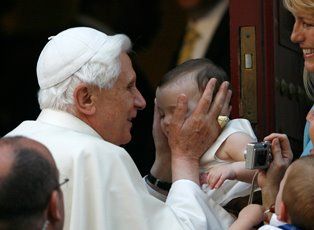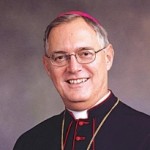
The great John Allen, perhaps the best English-language reporter on the Vatican beat, does yeoman’s work in three different articles, to which I am linking today. Allen takes knowledgeable, sometimes devastating but always fair looks at Pope Benedict XVI and the crisis that has engulfed him over the past few weeks and has come to -rather unjustly- define his papacy.
None of these pieces is fun to read. All of them are thoughtful, instructive and very valuable, particularly to anyone who wants to do more than read headlines and parrot them.
Allen asks, can a teaching pope get his house in order? while looking at how the strengths of Benedict’s papacy have all been buried, with the help of his own Communications team and his inattention “to the nuts and bolts of internal ecclesiastical administration.”
*The public image of this “teaching pope,” a man friends and foes alike acknowledge as a towering intellectual and theologian, is being defined by almost everything other than his teaching;
* There’s a positive story to tell about Benedict XVI — perhaps principally his embrace of “Affirmative Orthodoxy,” meaning an emphasis on what the church is for rather than what it’s against — but the people who know that story best, Benedict’s most trusted aides, often seem remarkably incapable of telling it;
* A pope elected in part to fix problems of internal governance under his predecessor has instead assembled a regime that seems to lurch from one crisis to the next, making the papacy of John Paul II look like a well-oiled machine in comparison;
* A pope known by insiders as the great reformer on the sex abuse crisis has now become, at least in some influential circles, the global symbol of the problem.Collectively, what these ironies point to is a sharp contrast between “insider” and “outsider” perceptions of Benedict XVI.
For insiders, Benedict looms as one of the great teaching popes of the last couple of centuries. […] Of course, this is not what the outside world sees, and it’s definitely not the dominant media storyline. Instead, for the vast majority of people on the planet, Benedict’s pontificate has been defined largely by its train-wrecks.
In the UK Spectator, Allen, in a long exposition, “don’t be daft; you can’t put the pope on trial
Despite Robertson’s attempt to link the Holy See with the Bush administration because a Bush lawyer once confirmed its sovereign status in an American court, the Vatican’s legal independence also allowed Pope John Paul II and his envoys to emerge as the most important moral critics of the US-led war in Iraq in 2003.
By any reasonable standard, Pope Benedict XVI is the head of a sovereign entity and entitled to immunity under international law.
Ultimately, however, that’s not the reason why attempts to indict Benedict as the mastermind of a global conspiracy to protect paedophile priests miss the mark. If he truly were guilty as charged, then an effort to bulldoze through centuries of legal precedent to bring him to heel might be warranted.
In reality, those who have paid attention to this story over the past decade — as opposed to waking up to it only now — realise that no senior figure in the Catholic Church has done more to combat priestly sex abuse than the current pope.
In 2001, Pope John Paul II placed the then Cardinal Joseph Ratzinger, the man who is now Benedict XVI, in charge of the Vatican’s response to the crisis. Ratzinger was compelled carefully to study the case files of every priest credibly accused of sexual abuse anywhere in the world. That experience gave him a grasp of the depth and gravity of the problem that almost no one else, inside the Catholic Church or out, can claim.
You’ll want to read the whole thing.
Finally there is this headspinner: Vatican Disses One of Its Own on Sex Abuse:
Late Thursday evening Rome time, the Vatican released a statement in response to media reports in France about a September 2001 letter from Colombian Cardinal Dario Castrillón Hoyos, at the time the prefect of the Vatican’s Congregation for Clergy, congratulating a French bishop for not reporting an abuser priest to the police.
In effect, the Vatican statement suggests that Castrillón Hoyos was part of the problem which then-Cardinal Joseph Ratzinger, now Pope Benedict XVI, eventually solved.
[…]
Castrillón Hoyos’s letter congratulates Pican for not repoting Bissey to the French police and civil authorities. In the version published by Golias, it reads: “I rejoice to have a colleague in the episcopate who, in the eyes of history and all the others bishops of the world, preferred prison rather than denouncing one of his sons, a priest.”Thursday night’s Vatican statement suggests that Castrillón Hoyos’s attitude was part of the reason that then-Cardinal Joseph Ratzinger, now Pope Benedict XVI, pressed for a more aggressive policy on the removal of predator priests.
Once again, if you read it all, Ratzinger comes away (as he does in this piece on a different matter) as seemingly the only guy in Rome with any integrity.
I cannot wait to read the tireless John Allen’s reports from Benedict’s trip to Malta
Sr. Mary Ann Walsh has more thoughts on all of this.
Over at America Magazine, Austin Ivereigh has more on this, and one should also read his very insightful piece of April 12, where he notes:
The scapegoat mechanism comes into play when tensions — often buried and unconscious — accumulate, when those involved must ‘let off steam’ or the social fabric will burst. The energy of indignation and anger is fuelled, over this issue, by the fact that sexual abuse of minors is extremely common in families — 70 per cent of victims have suffered at the hands of a relative — yet almost never talked about, let alone dealt with. The Church has become a surrogate victim, unconsciously identified as the cause of the tension which society feels but cannot identify.
This is not a way of deflecting from the Church’s real failures on this issue . . .But the coverage has now moved into a new, irrational phase. The media have merged with the mob. They are not standing outside the crowd, coolly examining the facts. They are standing in locus vulgi.
Meanwhile, over at Whispers in the Loggia, Rocco Palmo has video to a local press conference in Tennessee, which demonstrates “that the church — at least, on these shores — can handle allegations firmly, fairly, swiftly and with transparency and healing paramount”
The church reacts here, in accordance with the policies put in place since 2002, that one local scribe takes note:
One week ago, a priest in Denver was accused of sexually abusing a minor in the early 1970s. The very next day he was sacked — withdrawn from active ministry and, as the Denver archdiocese’s press release says, stripped of “his priestly faculties.”
Three days later both the complaint and the archdiocese’s response were announced to the world. Now that’s taking abuse allegations seriously.
Is there any other institution or employer that would act this decisively on the basis of a single, uncorroborated accusation dating back decades? Let’s hope not. It’s understandable that church officials feel obliged to take such ruthless action given the debacle of the sexual abuse scandal. If they didn’t, they’d be accused of a cover-up. But the policy — in place since 2002 — is draconian and would trigger indignation if imposed anywhere else.
Related: A reader last night asked me what I thought of Peggy Noonan’s piece. I think she made a few good points, but her suggestion of a vague “elevation” of women and the young does not appear to take into account just how “elevated” women have become. A cleric recently pointed out to me:
“In the Brooklyn Diocese, women are in charge of the office that deals with abuse cases — it was a nun who came to our parish to tell us about [an accused priest], and it’s another nun who oversees the VIRTUS training program and makes sure that all parishes are in compliance. In a number of dioceses, they also have women serving as chancellor — in effect, the second most powerful person, after the bishop.”
It may be a popular meme, but the truth is ordaining women is not a magic elixir against the problem of abuse, or of closed-ranks clericalism. A female Episcopal priest writes here, that the effect in her church has been decidedly mixed.
I thought it odd in the extreme that Noonan could write a whole piece on this crisis and not once mention the pope who has done the most to address it. Benedict is completely absent from her piece and I couldn’t help but wonder if she was feeling he was “too hot” to stand up for. If so, she has contributed to the toxicity of a narrative, when she could have assisted in administering some antidote. But two of my correspondents were of an opinion that I think I agree with.
From a male: “I’m coming to agree, more and more, that the all-male celibate priesthood isn’t the problem — it’s the culture surrounding it. Women can be just as ambitious, conniving, secretive and exclusionary. As someone who worked in Washington, Noonan should understand that.”
From a female: “Saying that the answer is to promote the young and have women everywhere at the Vatican? Right. Because JFK and Obama make such sterling statements for youth leading wisely and Hilary Clinton and Nancy Pelosi prove that women can’t go wrong when its a life issue dealing with children.”
As a good friend would say: “hotsy-totsy! Ouch!”
Lots more to read. We’re still waiting on the full transcripts of Benedict’s tantalizing and impromptu remarks from yesterday.
Julie at Happy Catholic has a round-up of sorts. She is too generous in her remarks touching me, but otherwise, that’s a sturdy resource page.
Edward T. Oakes, S.J.: The Moral Consequences of Episcopal Sin
William McGurn: The Pope and the New York Times
Peter Brown: Is the Church too big?
Unrelated, but interesting:
Nebraska Outlaws Late Term Abortions: Because fetuses feel pain Barely covered in media.
My Benedictine Brothers: Retranslating the Grail Psalms
Msgr. Charles Pope: There is a Force to Holiness
Joe Carter: Four Reasons You Might Be Aborted
Crittenden: Not the rich, nor the powerful
David Mills: the “unfairly demonized” church
7,500 shoppers: Sold their souls to the Devil, online
The Aquinas Conquest
The Death of the Church: Greatly exaggerated
Crescat: Her long-anticipated trip to Malta to see Benedict may be canceled due to volcanic ash
What a picture!: Reminds me of the devil screaming from the abyss as Christ dies on the cross











